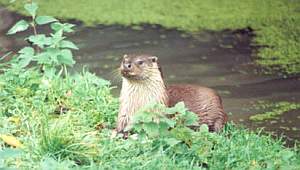Evil Pest? Deadly?
Marauding? Menace?
Across the media we are being bombarded with stories that otters are now everywhere in the UK, and most worrying that they appear to have become a “demonic pest”. We have headlines such as “deadly otters causing fish havoc”, “the otter menace”, and “marauding otters causing £1000s worth of damage”.
But how true is this?
There has been a lot of misinformation in the media so what exactly are the TRUE facts about otters in Britain? Are they really everywhere?
Otter surveys are all based on finding spraint (otter droppings) but this cannot be related to actual numbers. An otter may be recorded in several recording squares which can give a FALSE indication. But even with these limitations, it is estimated that there are ONLY about 10,000 otters in the WHOLE of the UK, with approximately 8,000 in Scotland and 2,000 in England and Wales. So this remains a very vulnerable population.
What about the otters which are being introduced?
This is misinformation, NO otters have been reintroduced since the late 1990s and during the whole programme which lasted 16 years only 117 otters were released. The ONLY otters being released now are orphaned ones, which have been reared and would normally have been in the wild anyway – these only number a few per year.
 We all know that otters are semi-aquatic so what happens when there is a drought? Where will they find their prey?
We all know that otters are semi-aquatic so what happens when there is a drought? Where will they find their prey?In drought conditions, the otter has to travel further to find it’s food, of course. Similarly, in times of flood it is also very difficult for otters, with high mortality rates, as young may easily become separated from their mother. In addition, increased human development impinges on the otter’s habitat, with much of our British countryside now being used for housing, industrial, retail and road developments. So is it any wonder, taking into account these scenarios, that otters are now appearing in strange places, like town centres.
What can be done where there is a (real) problem?
Recently, the International Otter Survival Fund (IOSF), held a conference in Edinburgh to bring together otter scientists and fishery people to discuss the true facts about otters and fishery predation problems. The report on this meeting can be found here.
No-one can deny that otters will take fish from ponds, and this can be very upsetting to the pond owners and sometimes very expensive. So following the Edinburgh conference a working group has been set up to develop research into problems and help fishery owners to protect their stock. The working group consists of otter scientists, fish farmers and bodies such as the Angling Trust, Predator Action Group and the Environment Agency. Help and advice is available by contacting the IOSF and grants are available from the Environment Agency to help with costs for protective measures for fisheries.
Otters are actually GOOD news – for all parties!
In the early part of the 20th century the otter population was very healthy but then in the 1950s and 1960s there was a serious crash. This was caused largely by pollution but at that time it was still legal to hunt otters. The presence of otters shows that our water quality is improving and this is GOOD NEWS for everyone – for otters, for other wildlife, for fish, and for people including anglers. Otters can also be a friend of anglers and the environment by tackling mink, which really are a non-native pest.
Many anglers are naturally very concerned for their fish and some get angry and want to take action. The otter is, of course, protected by law and it is illegal to harm or kill an otter or to disturb its place of rest (holt). But there are also many anglers who do appreciate otters, and realise that instead of ranting against them it is time to accept that they are here and that there is help available.
The otter certainly doesn’t deserve the bad press currently being stirred up by various media – we all want an environment which is available to all, and for this there has to be a balance and acceptance of our place in it. With that comes responsibility. We cannot afford to become complacent again and then suddenly find that otters have all disappeared.
Those who care about otters and those who are in the fishery business must all work together to the benefit of otters, fish and the environment.
Photo by Mary Heathcote








